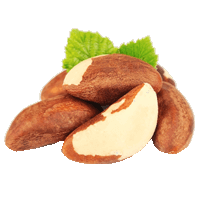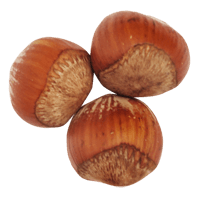Nuts, almonds, blanched nutrition: calories, carbs, GI, protein, fiber, fats
*all the values are displayed for the amount of 100 grams
Top nutrition facts for Nuts, almonds, blanched

| Calories ⓘ Calories for selected serving | 590 kcal |
| Net Carbs ⓘ Net Carbs = Total Carbohydrates – Fiber – Sugar Alcohols | 9 grams |
| Acidity (Based on PRAL) ⓘ PRAL (Potential renal acid load) is calculated using a formula. On the PRAL scale the higher the positive value, the more is the acidifying effect on the body. The lower the negative value, the higher the alkalinity of the food. 0 is neutral. | 4.4 (acidic) |
Nuts, almonds, blanched calories (kcal)
| Calories for different serving sizes of nuts, almonds, blanched | Calories | Weight |
|---|---|---|
| Calories in 100 grams | 590 | |
| Calories in 1 tbsp | 54 | 9.1 g |
| Calories in 1 oz | 167 | 28.35 g |
| Calories in 1 cup whole kernels | 856 | 145 g |
Mineral coverage chart
Mineral chart - relative view
Vitamin coverage chart
Vitamin A:
0µg of 900µg
0%
Vitamin E:
71mg of 15mg
475%
Vitamin D:
0µg of 20µg
0%
Vitamin C:
0mg of 90mg
0%
Vitamin B1:
0.57mg of 1mg
48%
Vitamin B2:
2.1mg of 1mg
164%
Vitamin B3:
11mg of 16mg
66%
Vitamin B5:
0.94mg of 5mg
19%
Vitamin B6:
0.35mg of 1mg
27%
Folate:
147µg of 400µg
37%
Vitamin B12:
0µg of 2µg
0%
Vitamin K:
0µg of 120µg
0%
Vitamin chart - relative view
Macronutrients chart
Protein:
Daily Value: 43%
21.4 g of 50 g
21.4 g (43% of DV )
Fats:
Daily Value: 81%
52.5 g of 65 g
52.5 g (81% of DV )
Carbs:
Daily Value: 6%
18.7 g of 300 g
18.7 g (6% of DV )
Water:
Daily Value: 0%
4.5 g of 2,000 g
4.5 g (0% of DV )
Other:
2.9 g
2.9 g
Protein quality breakdown
Tryptophan:
579mg of 280mg
207%
Threonine:
2046mg of 1,050mg
195%
Isoleucine:
2088mg of 1,400mg
149%
Leucine:
4437mg of 2,730mg
163%
Lysine:
1815mg of 2,100mg
86%
Methionine:
570mg of 1,050mg
54%
Phenylalanine:
3468mg of 1,750mg
198%
Valine:
2415mg of 1,820mg
133%
Histidine:
1788mg of 700mg
255%
Fat type information
Saturated fat:
4 g
Monounsaturated fat:
33 g
Polyunsaturated fat:
12 g
Carbohydrate type breakdown
Starch:
1 g
Sucrose:
4.5 g
Glucose:
0.03 g
Fructose:
0 g
Lactose:
0 g
Maltose:
0.14 g
Galactose:
0 g
Fiber content ratio for Nuts, almonds, blanched
Sugar:
4.6 g
Fiber:
9.9 g
Other:
4.1 g
All nutrients for Nuts, almonds, blanched per 100g
| Nutrient | Value | DV% | In TOP % of foods | Comparison |
| Vitamin A | 0µg | 0% | 100% | |
| Calories | 590kcal | 30% | 3% |
12.6 times more than Orange
|
| Protein | 21g | 51% | 21% |
7.6 times more than Broccoli
|
| Fats | 53g | 81% | 3% |
1.6 times more than Cheese
|
| Vitamin C | 0mg | 0% | 100% |
N/A
|
| Carbs | 19g | 6% | 36% |
1.5 times less than Rice
|
| Net carbs | 8.8g | N/A | 48% |
6.2 times less than Chocolate
|
| Cholesterol | 0mg | 0% | 100% |
N/A
|
| Vitamin D | 0µg | 0% | 100% |
N/A
|
| Magnesium | 268mg | 64% | 10% |
1.9 times more than Almonds
|
| Calcium | 236mg | 24% | 10% |
1.9 times more than Milk
|
| Potassium | 659mg | 19% | 9% |
4.5 times more than Cucumber
|
| Iron | 3.3mg | 41% | 18% |
1.3 times more than Beef broiled
|
| Sugar | 4.6g | N/A | 49% |
1.9 times less than Coca-Cola
|
| Fiber | 9.9g | 40% | 11% |
4.1 times more than Orange
|
| Copper | 1mg | 114% | 17% |
7.2 times more than Shiitake
|
| Zinc | 3mg | 27% | 31% |
2.1 times less than Beef broiled
|
| Starch | 1g | 0% | 96% |
15.3 times less than Potato
|
| Phosphorus | 481mg | 69% | 10% |
2.6 times more than Chicken meat
|
| Sodium | 19mg | 1% | 81% |
25.8 times less than White bread
|
| Vitamin E | 24mg | 158% | 34% |
16.3 times more than Kiwi
|
| Manganese | 1.8mg | 80% | 28% | |
| Selenium | 3.2µg | 6% | 72% | |
| Vitamin B1 | 0.19mg | 16% | 35% |
1.4 times less than Pea raw
|
| Vitamin B2 | 0.71mg | 55% | 12% |
5.5 times more than Avocado
|
| Vitamin B3 | 3.5mg | 22% | 47% |
2.7 times less than Turkey meat
|
| Vitamin B5 | 0.31mg | 6% | 72% |
3.6 times less than Sunflower seeds
|
| Vitamin B6 | 0.12mg | 9% | 61% |
Equal to Oats
|
| Vitamin B12 | 0µg | 0% | 100% |
N/A
|
| Vitamin K | 0µg | 0% | 100% |
N/A
|
| Folate | 49µg | 12% | 35% |
1.2 times less than Brussels sprouts
|
| Trans fat | 0.02g | N/A | 70% |
783.7 times less than Margarine
|
| Choline | 52mg | 9% | 65% | |
| Saturated fat | 4g | 20% | 30% |
1.5 times less than Beef broiled
|
| Monounsaturated fat | 33g | N/A | 9% |
3.4 times more than Avocado
|
| Polyunsaturated fat | 12g | N/A | 11% |
3.8 times less than Walnut
|
| Tryptophan | 0.19mg | 0% | 66% |
1.6 times less than Chicken meat
|
| Threonine | 0.68mg | 0% | 69% |
1.1 times less than Beef broiled
|
| Isoleucine | 0.7mg | 0% | 70% |
1.3 times less than Salmon raw
|
| Leucine | 1.5mg | 0% | 66% |
1.6 times less than Tuna Bluefin
|
| Lysine | 0.61mg | 0% | 75% |
1.3 times more than Tofu
|
| Methionine | 0.19mg | 0% | 76% |
2 times more than Quinoa
|
| Phenylalanine | 1.2mg | 0% | 47% |
1.7 times more than Egg
|
| Valine | 0.81mg | 0% | 69% |
2.5 times less than Soybean raw
|
| Histidine | 0.6mg | 0% | 64% |
1.3 times less than Turkey meat
|
| Fructose | 0g | 0% | 100% |
N/A
|
| Caffeine | 0mg | 0% | 100% | |
| Omega-3 - EPA | 0g | N/A | 100% |
N/A
|
| Omega-3 - DHA | 0g | N/A | 100% |
N/A
|
| Omega-3 - DPA | 0g | N/A | 100% |
N/A
|
| Omega-6 - Eicosadienoic acid | 0g | N/A | 100% |
Check out similar food or compare with current
NUTRITION FACTS LABEL
Nutrition Facts
___servings per container
Serving Size ______________
Serving Size ______________
Amount Per 100g
Calories 590
% Daily Value*
81%
Total Fat
53g
18%
Saturated Fat 4g
0
Trans Fat
0g
0
Cholesterol 0mg
0.83%
Sodium 19mg
6.2%
Total Carbohydrate
19g
40%
Dietary Fiber
9.9g
Total Sugars 0g
Includes ? g Added Sugars
Protein
21g
Vitamin D
0mcg
0
Calcium
236mg
24%
Iron
3.3mg
41%
Potassium
659mg
19%
*
The % Daily Value (DV) tells you how much a nutrient in a serving of food contributes to a daily diet. 2,000 calories a day is used for general nutrition advice.
Health checks
ⓘ
Dietary cholesterol is not associated with an increased risk of coronary heart disease in healthy individuals. However, dietary cholesterol is common in foods that are high in harmful saturated fats.
Source
Low in Cholesterol
ⓘ
Trans fat consumption increases the risk of cardiovascular disease and mortality by negatively affecting blood lipid levels.
Source
No Trans Fats
ⓘ
Saturated fat intake can raise total cholesterol and LDL (low-density lipoprotein) levels, leading to an increased risk of atherosclerosis. Dietary guidelines recommend limiting saturated fats to under 10% of calories a day.
Source
Low in Saturated Fats
ⓘ
While the consumption of moderate amounts of added sugars is not detrimental to health, an excessive intake can increase the risk of obesity, and therefore, diabetes.
Source
Low in Sugars
References
All the values for which the sources are not specified explicitly are taken from FDA’s Food Central. The exact link to the food presented on this page can be found below.


